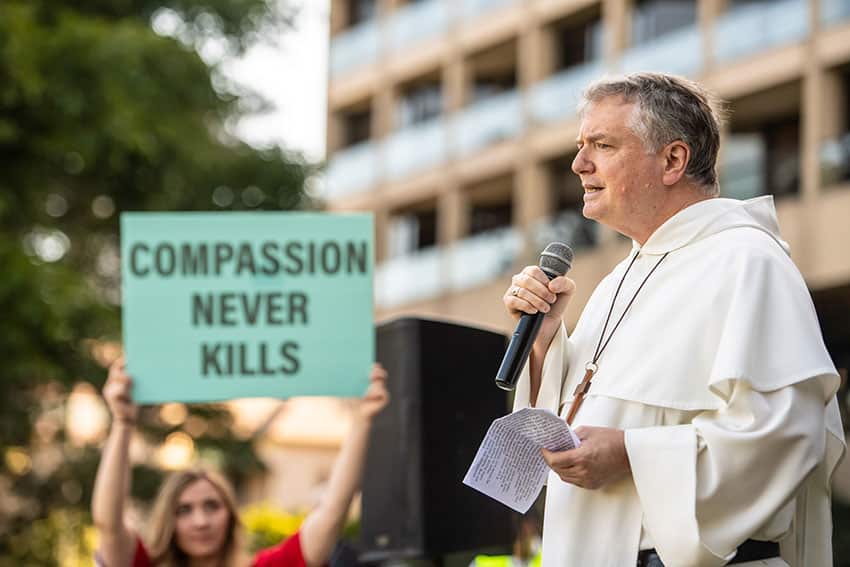
Today is a dark day for New South Wales, as the law allowing euthanasia and assisted suicide comes into effect. No doubt some will celebrate it, and others bemoan it.
For, at a time when social cohesion is needed more than ever, this is a divisive law. It divides us into two classes of people: those whose lives are worth fighting for to the end, and those whose lives we consider a burden to themselves and others that we will not carry.
The first group receives quality medical and psychological care, suicide prevention programs and help lines. The latter’s care is crowned by taxpayer-funded suicide “navigators” tasked with guiding them through the process of prematurely ending their life.
Today’s law also divides us along other lines. Some will be able to opt out of performing euthanasia, and assisting or hosting suicides. But many will not.
Faith-based nursing homes, in particular, will from today be required by NSW law to host euthanasia on their premises and to enable it in various ways.
The conscience rights of the nuns and others, whose aged care facilities have cared for thousands of our elders are being trampled on. NSW Health also wants to override the professional objections of public hospital doctors by requiring them to admit as their patients people requesting euthanasia.
Those of us troubled by state-sanctioned, medicalised killing must recognise that its supporters are good willed. They genuinely believe that this is a benevolent thing to do for someone who is suffering or a respectful thing to allow for someone who chooses it.
But it is a radical departure from Judeo-Christian ethics and from classical medical ethics to suppose that giving a person a lethal drug is a form of healthcare. It’s just the eliminating discomfort and distress and ensuring choice and control at the end of life.
Ironically, the state is now providing the social choice of an early death, while restricting the choice of palliative care.
If the law can now make space for euthanasia, why can’t it support both public and faith-based facilities providing high quality, medically informed, end-of-life care also?
We know these laws have enormous potential for bracket creep. Today euthanasia is for those with a terminal illness expected to die in the coming months. But who knows where we’ll be by this time next year or next decade?
Everywhere euthanasia has been legalised the protections have been gradually removed and those deemed eligible have been gradually broadened. Canada, Belgium, Holland: all have moved from euthanasia or assisted suicide as a last resort for the terminally ill to this being the ordinary way of dying for many people—one every forty minutes in Canada.
Not just the terminally ill, but now the chronically ill or disabled. Not just those with physical sickness, but now the depressed, lonely or homeless. Not just adults, but now children and infants.
Laws like these have the effect of numbing our social conscience, making us forget our sacred obligation to care for the weak and doctors’ obligation never to harm, even when asked.
In Canada what was sold as “compassionate care for the dying” is increasingly accepted as a solution to poverty. Is this where we want New South Wales to go? Euthanasia has barely been legalised in this state, and already the NSW government is ramping down our palliative care services.
Those who lobbied for the law that commences today deny there will be any slippery slope in their “voluntary assisted dying” regime. They assure us they’ve put watertight safeguards in place to prevent wrongful deaths.
I challenge them to make good on these assurances and to advocate against the loosening or misuse of these laws as zealously as they advocated for their passage.
For my part, I commit myself and the Catholic Archdiocese of Sydney to continue to press for fair laws and policies around the end-of-life, while doing our best to provide truly compassionate care to people of all faiths and none.
I ask our lawmakers and community to give us the legal space to do so.
And I pray that the Lord of Life and Prince of Peace, whose coming we will celebrate at Christmas, fills us all with his life and love.
